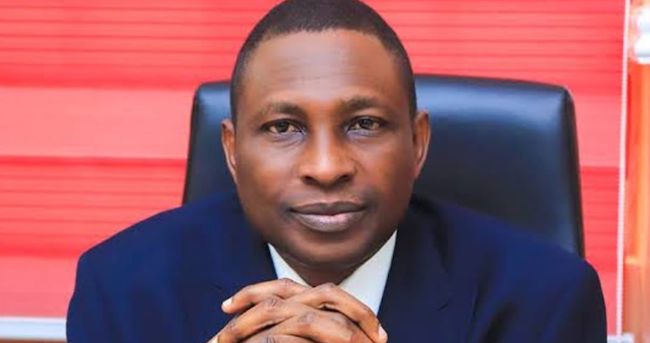
ACCUSATIONS by Nigeria’s anti-graft agency that the country’s banks are deeply involved in fraud and forgery underscore the entrenched financial decay in national life. In a brutally frank moment, Ola Olukoyede, the Chairman of the Economic and Financial Crimes Commission, blamed the high rate of financial crimes in the country on the banking sector. This resonates one way or the other: most citizens and corporate entities have been victims of the fraudulent activities of Nigerian banks. The ball is in Olukoyede’s court to clean up the sordid mess smearing the industry.
According to Olukoyede, an estimated 70 per cent of financial crimes in Nigeria are found in the banking industry. This is a staggering percentage, but it is not surprising. Delivering a speech at the 2024 retreat of audit executives of banks, the EFCC czar indicted the banks, explaining that the crimes are insider- and outsider-related. The deadliest is the collusion between the two parties, he said.
This is not the first time the banks are in the spotlight for abetting fraud. In 2019, the then EFCC acting chairman, Ibrahim Magu, alleged that 10 banks were engaged in money laundering. The Financial Institutions Training Centre, formed by the Central Bank of Nigeria and the banks, reported that the institutions lost N159 billion to fraud from 2020 till date. Between 2022 and 2024, the banks sacked 110 executives and junior staff for fraud.
“In Nigeria particularly, the banking sector is increasingly becoming a cesspool of fraudulent activities, and this is raising considerable challenge and concerns to the EFCC,” Olukoyede lamented.
Indeed, there is substantial evidence to back up the malfeasance in the banking system. This is disturbing because the industry plays a major role in the economy. The Nigerian Deposit Insurance Corporation said banking assets grew 2.01 per cent to N53.31 trillion as of quarter two in 2021. According to TheGlobalEconomy.com, banking contributed an all-time high of 20.36 per cent to Nigeria’s GDP in 2016 and 16.40 per cent in 2021. The fraudulent activities will constrict it from reaching its potential as the global average of banking-to-GDP was 71.17 per cent (2021).
The insider-related abuse includes the outright stealing of customers’ deposits, authorising loan facilities, and forgery. From the outside, hacking, ATM fraud, and conspiracy are prevalent. Bank customers lose their funds to failed transactions, especially at PoS terminals.
On Tuesday, the matter assumed an international dimension. The Bank of Ghana suspended the forex licences of two major Nigerian banks for one month for irregularities. In Nigeria, the regulators will talk tough initially and end up giving the banks a slap on the wrist.
This happened in 2015 when the CBN fined two of them N4.8 billion for not remitting NNPC’s N96.4 billion to the Treasury Single Account of the Federal Government. The fine is not weighty, as it is just 5.0 per cent of the withheld sum. A few months later, the CBN barred nine other banks from the foreign exchange market for not remitting $2.33 billion of NNPC/LNG funds to the TSA.
Therefore, the EFCC and the CBN must descend heavily on the banks for wrongdoing. This is the global practice to strengthen an industry sustained by trust. These government agencies must investigate the accusations by CBN Governor, Olayemi Cardoso, that the banks are partly responsible for the rapid depreciation of the naira through round-tripping of dollars for personal gain.
In Nigeria, bank charges are too high and send a wrong message to the public. The CBN should reinstate the customer-friendly regulations as done when Lamido Sanusi was the governor.
On their part, the banks must do more to disabuse the mind of the public by providing top-notch service and resolving declined and wrong debit notes without hassles.





